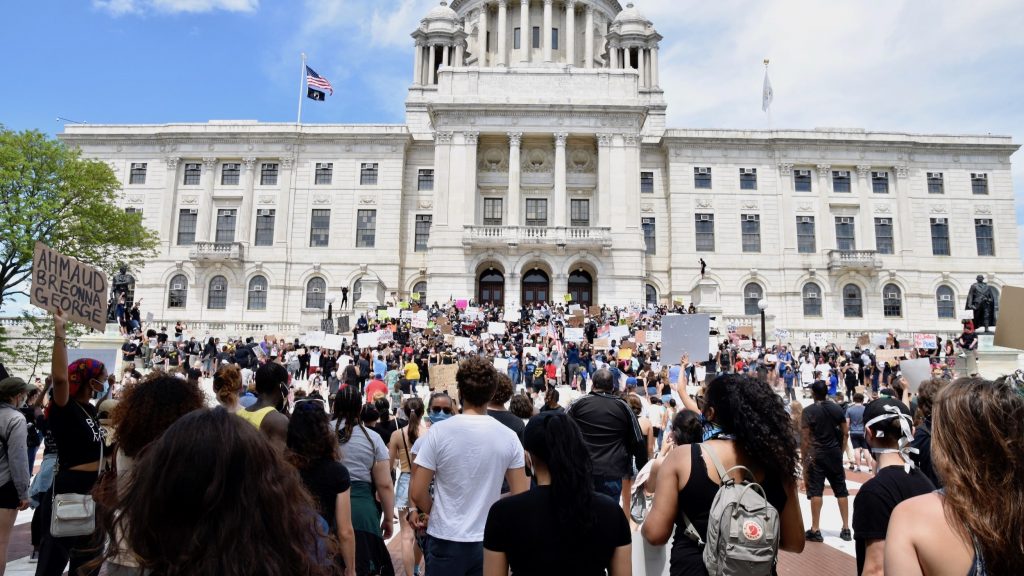Taylor: Why did you determine that it is necessary to build a mass socialist party, independent of the Democrats? And what do you say to those who maintain that it will be impossible to create any viable alternative to the Democrats in the U.S., given the many ballot-access obstacles, the winner-takes-all political system, and the millions and billions of dollars in campaign funding for the Democrats?
First of all, it’s important to distinguish between the idea of what a socialist party means to us, versus the predominant idea, which is just a party that acts through electoral means, right? For us, we are envisioning a different kind of movement building, where we have a very long-term commitment to organizing in communities, to providing things for people, to building roots in communities, so that it’s not just, you know, we come around and tell people that it’s the most important election of their life, and that they need to vote or else. So, this is the type of party that is more familiar from historical socialist parties like the German SPD or the American CP. So, I don’t think we should necessarily consider our model as a party independent of the Democrats that has the exact same model of organization as the Democrats.
We determined that it was necessary to do something like this partially because of local conditions. Rhode Island is a state that is very dominated by the Democratic Party. It is, for all intents and purposes, a one-party state. And on the whole, that party has proved unwilling and structurally incapable of representing its working-class constituents. So we’ve had a hard time, even when we got people elected on the Democratic ballot line, making sure that they could actually carry out what they wanted to do, and what they thought would benefit their constituents. I have a lot of respect for all of our electeds individually, but man, it is really hard when you get in the State House not to play into those systems.
The final point of that question, which is something that’s come up a lot on Twitter, with maybe some validity, are ideas about what the future party we are trying to build can get accomplished in the electoral arena, problems with first past the post ballot access, millions and billions of dollars in campaign funding. What history shows us is that things like more inclusive ballot access and proportional voting systems actually come after an organized socialist movement. In most historical cases policies like proportional representation are something that socialists fight for as a democratic measure, and not something that is simply beneficently given by capitalists so that socialists can start participating in politics. And again, that’s the outgrowth of the activity of an organized and focused and militant socialist party which we’re trying to build.
Belano: DSA has elected several of its members to Congress, such as Alexandria Ocasio-Cortez (AOC), Cori Bush, and Rashida Tlaib. What is your perspective of the record of these figures in office, and what lessons can be drawn from those experiences?
A major galvanizing moment for the resolution was the rail vote. Many of us did feel betrayed by the way people like AOC voted. In general, we can see that the voting record of people like AOC, Tlaib, and of course Jamaal Bowman, have not necessarily tracked with what most people in our chapter would consider principled socialist politics. And again, I’d like to emphasize that this isn’t necessarily a moral failing with these people. It is the way the system is set up.
That being said, the resolution as we’ve passed, it, is not a flat condemnation of people who choose to run on the Democratic ballot line. What it is, for us, is a sober assessment of where our energies as a medium-sized DSA chapter are best placed. And our assessment was that if we’re going to expend energy on electoral organizing work, we would like to do it with an eye toward building up an independent movement, rather than what we’d seen before, which was that we expend a lot of time and effort getting candidates elected on the Democratic ballot line. And when they are eventually forced by the exigencies of the State House to make concessions or break from a strictly socialist politics, we have to experience the disorganizing effects that come along with those failings. So we just thought that if we’re going to spend time on electoral politics, from the perspective of our limited capacity, we wanted to do it for something that we felt like was a valid long-term goal.
Taylor: So after Bernie Sanders’s first campaign, some leaders of the DSA called for a dirty break strategy. They were like, look, we’re just gonna continue to run candidates within the Democratic Party while forming an independent organization that will eventually allow us to not run as Democrats, and leave it all together. I wonder what you see is the problem with that strategy, and where has that strategy gone, because it seems like the dirty break strategy does not exist anymore?
As the resolution stands, it’s not necessarily even a condemnation or a break with the dirty break strategy. What we’re fundamentally saying is that in Rhode Island, in these conditions, this is the strategy that we think makes sense.
That being said, I think there’s two angles from which you can critique the dirty break. You can come at it from a theoretical perspective, and the problem there would be that the dirty break strategy assumes the Democratic Party is some kind of neutral medium that you can build movements in, as if there isn’t some kind of systemic force in the Democratic Party that pushes people toward reactionary political conclusions. And it seems to me that the Democratic Party has a very obvious class character. I would have to see concrete evidence that that would be possible, because it seems like on the face of it is not.
The other angle, which I was kind of getting at before, is the practical one. I think — I’m sure you guys know this very well, that when you become an organizer and start working with people, one thing you really want to see is a concrete plan of action, with measurable win-and-lose conditions. With the dirty break I have not necessarily seen dirty breakers propose concrete conditions under which they would consider breaking with the Democratic Party. I also haven’t seen any sort of plan for DSA to organize within the Democratic Party and build up something that would eventually be capable of a break. I’m sure that people from local chapters can provide me with good examples of where progress like that has been made, but it seems to me totally ad hoc, and fundamentally incapable of challenging the Democratic Party apparatus.
Belano: It seems to us that aside from a few organizations, or a few chapters like yours — we are in touch with the Boise, Idaho, chapter, which is also advocating for independence from the Democratic Party — the majority in DSA seems to believe in working within the Democratic Party. And so our question is, do you intend to attempt to build momentum behind the campaign for independence outside Rhode Island with other chapters who could be sympathetic? If so, what have been some of the discussions about how to do that?
We’ve been really encouraged by the kind of work that people and chapters who are thinking similar things, like Boise, and I think some people in Buffalo, too. As far as thinking about something on that kind of [national] level, I think that we have to show that it can work at our level first. Like, I think that at this point we really need to pursue things on a local level. We are more than happy talking with other folks, and do, but it does seem like this is a discussion that is happening in DSA at all levels in a variety of chapters, so I think the best thing that we can do is really try to implement our strategy on a local level, show that it is viable, and then think about next steps after that once we have built capacity.
Taylor: When most people, even many on the Left, and I think you alluded to this in the beginning, when they talk about political parties, they envision participation in elections. But the kind of party that even the resolution is proposing goes beyond simply electoral politics. So can you elaborate more on the need for the socialist party to take part in class struggle?
Well, six or seven months ago, our chapter was in a period of transition, where it was clear that we needed to pick some sort of direction. So we formed a platform committee to build a new platform for the chapter. We ended up going through lots of historical examples of what tactics have worked under similar circumstances to our own. One of the universal takeaways is that socialism has not ever in history been won using the model of the Democratic Party, a strictly electoral apparatus. What we tended to find much more was that socialist parties were part of a mass movement that encompassed a bunch of things, including to a greater or lesser degree electoral politics. What ends up happening with the party is that it’s a means to repoliticize parts of our lives that have been untouched or off limits to strictly electoral campaigning. You know, CPUSA members helped oppose evictions. Other socialist parties, like the SPD [in Germany], provided free education. One thing that we’re starting to do in Rhode Island DSA is to do more social and political events in our state. These are really organizations that understand that life is political, and that the scope of politics cannot be restrained to voting every once in a while, for the same sort of crop of capitalist candidates. It’s a much more thoroughgoing kind of organizing that doesn’t just revolve around the ballot box.
Belano: Along similar lines, we noticed from the resolutions from your last conference, you are proposing a series of tactics for your chapter to help organize unions in the workplaces of your members and democratize the existing unions. Can you tell us more about that, including your motivation for this decision?
So I have to give credit where credit is due. This labor strategy was the result of a lot of work by our labor chair, and other people in labor circles. Specifically, it was a lot of work by two of my comrades, Dan Crowell and Ben Carman. A lot of this particular resolution was a product of their sort of experimentation with an organizing tactic that I think is getting some purchase among DSA organizers, which is the idea of worker circles. In Providence, these are monthly meetings that our chapter holds for people who are engaged in labor organizing at their workplace, or who want to become engaged. People can come in whether or not they’re in a union, if they want to start a union, if they want to discuss democratizing their existing union and better their conditions. The meetings are also a way of providing practical political education for people, and to make sure that people in labor unions have the socialist tools to help them make sense of their situation.
The other sort of thing that Rhode Island DSA is pursuing is a rank-and-file job program, which, along with the workers circle, is enshrined in our seven resolution labor strategy. We recruited from our general body two volunteers to serve as rank-and-file coordinators. So these people will match people in the organization who want to get into unionized workplaces, help them find those types of jobs, help them get situated, and help them navigate union politics if they’re not familiar with it already.
We’ve also created a new system for strike support. So we’re having people whose official job in the chapter is to keep track of union contract expiration dates, making sure that people turn out to picket lines, doing important picket line work, and maintain and grow our connections to the rank and file of local unions. Of course, this is all with the long-term goals of increasing union density in the state and making sure that unions are actually democratic and accountable to their rank and file, and making sure that socialists have an important voice in the Rhode Island labor movement.
Taylor: We recently issued a call for the creation of a working-class party that fights for socialism, recognizing that the Democrats offer no solution to address the cost of living crisis, the ongoing attacks on democratic rights, or the climate emergency. Do you see a potential for socialist organizations around the country who are committed to class independence to collaborate toward the construction of a political alternative?
Yes, absolutely. I think that one of the major strengths of DSA — and I do have qualms with the way the organization is headed at the national level — is that we are, by and large, a nonsectarian organization. I think that is really valuable for the kind of work that we’re trying to do. I think people who are willing to work in good faith and who share these kinds of broader goals, that there’s absolutely no reason we shouldn’t work together. In fact, it’s necessary and would be very healthy for the various tendencies of the American socialist movement to be united around similar goals, and in a kind of formal structure.
Taylor: You mentioned earlier in the interview that you thought it was best for your group to try to build a successful model of a mass socialist party locally before you get nationally, but do you have some concerns about the limitations of a localist approach? One of the organizations you mentioned as an example of the type of party you are advocating for was the CPUSA. Certainly, the CPUSA in the early years (1920s and 1930s) was a party to aspire to. But it was national and international in scope. So I wonder if you feel like there’s some contradictions or limitations of a localist approach to the question of building a party?
That is an excellent question. I think that for this project, like anything with socialism, any component of that larger project, we fail unless it is a national and eventually global movement. So, to that end the theoretical part of me says yes, at some point collaborations with other chapters, learning from them — which we are already doing — and building up a national network will be really really important for the project we are envisioning.
But, on the other hand, I am a co-chair of a medium-sized DSA chapter who’s trying something new. So, of course, that goal, that sort of expansion and moving past the focus on the exclusively local state level, it’s really important and absolutely necessary. But to get to that point, we have to build up capacity. And we have to build up power locally, while also sort of pursuing these national questions among the DSA. So I think there’s maybe a little bit of both. I think that you have to have a broader scope, while also understanding that it takes a lot of local work for that to become salient.
Any final thoughts?
Yes. For anyone interested in getting involved with our politically independent electoral work, please fill out our volunteer form: https://forms.gle/jE2R7Tu1gVizgvoB7












